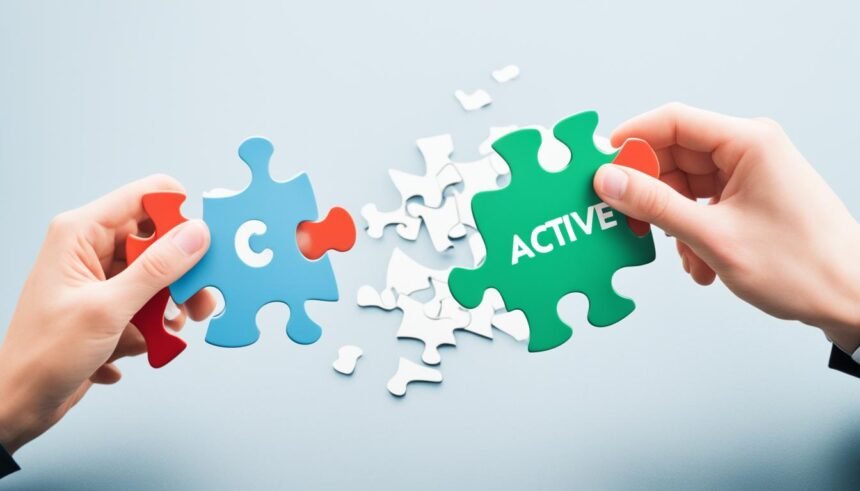Having good communication strategies is key in the professional world. A report by Grammarly found that bad communication costs U.S. companies a lot, $1.2 trillion every year. Good communication at work means both the person talking and the one listening feel good about it. This way, work gets done better because everyone understands what to do. This makes collaboration stronger on any project.
Key Takeaways
- Effective communication is crucial for professional success.
- It involves clear, solution-providing exchange of ideas and information.
- Collaboration and understanding the receiver’s perspective are key.
- Active listening and assertive communication are essential skills.
- Incorporating nonverbal cues, empathy, and intercultural awareness can enhance communication effectiveness.
Understanding Effective Communication
Effective communication at work isn’t just sharing info with team members. It’s about making sure they really get it. This makes the other person feel heard and truly understood. It helps teams work better together on tasks, leading to achieving their goals more effectively.
What is Effective Communication?
Effective communication means sharing information clearly and directly. It makes both the talker and the listener happy. It includes really listening, speaking up for what you need, and reading between the lines of what someone’s not saying. Good communication is key for solving problems, building relationships, and making sure everyone is on the same page with feedback.
Two-Way Communication
At work, two-way communication is a must. It helps create a space where everyone’s views and cultural backgrounds are respected. When people feel like they’re really listened to, it boosts their motivation and their connection with the team.
Solution-Providing Communication
Communication that works well is more than sharing news. It’s about suggesting answers and steps to fix issues. This approach, that focuses on solving issues and helping out, makes teamwork stronger. It leads to real progress because everyone is working towards a common goal.
Benefits of Effective Workplace Communication
When companies focus on good communication, it boosts the whole team. A recent study by Gallup found only 13% of bosses knew how to really talk to their staff. Yet, connecting well with employees is key for keeping them happy and productive.
Increased Employee Engagement
Good communication builds strong bonds between leaders and their teams. This makes staff more eager to help reach the company’s goals. They feel listened to and important, so they work harder to bring success.
Enhanced Motivation To Work
When workers see how their jobs impact the team, they get inspired. They understand their role is vital and work more efficiently. Clear communication from the top motivates everyone to do their best.
Improved Productivity
Companies that encourage open talks see less arguing. This means less time wasted on conflicts and more on the job. Teams become sharper and get more done, increasing overall output.
Fewer Workplace Conflicts
Great communication leads to less misunderstanding. By listening and speaking up clearly, many issues can be avoided. Including feedback and being aware of each other’s feelings and cultures is key. This way, challenges can be tackled early, leading to win-win solutions for all.
Tips for Effective Communication
To communicate well, start by knowing your goal. Then, figure out who you need to talk to. Finally, choose the best way to reach them. Good communication involves more than just talking. It means also listening carefully and giving valuable feedback.
Communicate the Right Way
It’s important that employees aren’t afraid to share their ideas or concerns with their managers. Managers, in turn, need to listen and talk about issues in a respectful way. Critical skills for this include being clear, courteous, and open-minded.
Prioritize Two-Way Communication
Good communication is a partnership. It’s about creating a place where everyone feels their voice is heard. Actively addressing employee feedback promotes teamwork and keeps everyone engaged.
Build Your Communication Skills
Improving your active listening, learning to speak up clearly, and picking up on nonverbal cues all help make you a better communicator. Providing your team with training to hone their communication abilities leads to better conflict resolution, understanding other’s perspectives, and more cultural awareness.

Embracing Uniqueness and Personal Interactions
To boost communication and employee engagement, embracing each team member’s communication style is key. Recognize the unique traits of your employees. This builds a more inclusive and collaborative environment where everyone is valued.
Embrace the Uniqueness of Each Employee
Every team member has their own traits. Some are assertive communicators loving group talks, while others prefer one-on-one talks and are reserved. As a leader, it’s important to adjust how you talk to each employee. This shows your empathy and intercultural awareness. It also helps you connect better with your team.
Have One-on-One Interactions
Arrange one-on-one meetings regularly with your team. This boosts personal interactions and lets you know their thoughts and dreams. In these talks, team members find it easier to talk freely. These chats are a chance for them to express feedback and emotional needs without the pressure of a crowd.
When you really listen and show you care, you strengthen your relationships. Plus, it helps make your workplace more trusting and open.
Fostering a Collaborative Environment
To improve work environments, focusing on collaboration is key. This improves how people talk, listen, and understand each other. Team meetings are a great way to do this. They let employees talk openly by using clear and honest communication. This way, everyone can work better together and overcome problems.
Schedule Weekly Team Meetings
Having team meetings every week is really important. This gives employees a regular chance to talk about their work. They can share what’s going well and what’s challenging. Doing this helps them listen better and understand each other. It also lets them focus on working towards the same goals.
Make Time for Team Building
Team building is also very important. It makes the workplace more friendly and open. Through activities like this, employees can learn to communicate better and read each other’s cues. This builds trust and helps everyone appreciate different cultures.
Show Appreciation
Recognizing the work people do is crucial. It shows your team that their efforts are valued. This positive feedback encourages them to continue working well together. Saying thanks goes a long way in keeping a positive vibe in the workplace.

Communication Strategies
In today’s world, good communication is key for workplaces to succeed. With the right tools, companies can make sure their teams work well together. This improves how much employees engage, shares information better, and increases productivity.
Get a Team Communication App
Remote and hybrid teams need to be able to talk and share easily. Communication apps make it simple to message, share files, and have video meetings. They help everyone listen, give feedback, and solve problems right away.
Create a Corporate Communication Plan
Having a good corporate communication plan is important. It makes sure everyone gets the right message when they need it. By linking your messages to your organizational goals and corporate culture, you help keep everyone on the same page. This improves how information flows and boosts intercultural awareness.
Encourage One-to-One Conversations
Talking one-on-one lets managers and workers deal with personal matters. It shows that each person is heard and understood. This way, they can build better professional relationships. These small, private talks encourage empathy and help people communicate clearly. This helps make everyone more engaged and productive.
Enhancing Communication Effectiveness
There are many ways to make workplace communication better. Using humor can break the ice and make talks easier. Making sure both sides talk and listen is key. This leads to true collaboration.
It’s also vital to keep your messages clear and the same on all platforms. This prevents misunderstandings. Adding visual aids to your talks can help people understand hard topics better.
Training your team in good communication skills is a solid choice. This includes how to really listen and ways to stay cool in tough talks. It boosts how well your team works together. Having regular, open meetings where everyone can speak up is also great. It helps create a vibe of trust and clear communication.
| Communication Strategy | Benefits |
|---|---|
| Inject Humor | Helps defuse tense situations and relax everyone involved |
| Nurture Two-Way Communication | Employees feel heard, and their feedback is acted upon, crucial for effective collaboration |
| Maintain Consistent Branding and Voice | Reduces ambiguity and enhances the clarity of messaging |
| Leverage Visual Aids | Makes complex information more clear and memorable |
| Provide Communication Skills Training | Improves workplace interactions and fosters a more collaborative environment |
| Conduct Open Team Meetings | Promotes a culture of transparency and open communication |
Conclusion
Good communication is key for doing well at work. It makes employees more engaged, motivated, productive, and collaborative. Knowing about active listening, assertive communication, and nonverbal cues helps. These things build a workplace where people understand each other and communicate well.
It’s important to see the value in each team member. Also, encouraging open feedback and being aware of different cultures are important. This creates a place where everyone works together smoothly.
Using special communication tools can make these efforts even more successful. Things like apps for team communication, plans for how the company communicates, and teaching employees about emotional intelligence help a lot. They let companies make the most of what their team can achieve, leading to ongoing growth and achievement.
Great communication is not just an extra skill. It plays a big part in becoming a top professional. When companies are good at solving problems and talking clearly, they become places where people trust each other and always aim to do better. This leads to a future full of success and progress.
FAQ
What is effective workplace communication?
Good workplace communication means everyone is happy with the work talk. It’s about clear and helpful messages. The goal is for everyone to understand each other. This way, people can work well together.
What are the benefits of effective workplace communication?
When people talk well at work, they get along better. This makes jobs more fun and cuts down on fights. Also, workers who know their jobs are key to the team try harder. This boost in effort makes the whole company better.
How can organizations improve communication and employee engagement?
Companies should respect how each person likes to talk. They should mix up how they talk with everyone too. This means one-on-one chats, big team meets, and fun team activities. It all helps people feel good and work together better.
What are some effective communication strategies for the workplace?
Good workplace talking isn’t just about speaking. It’s also about hearing what others say and sharing thoughts. It’s key for workers to feel they can talk to bosses. Or bring up ideas without worry. Bosses should be good listeners and always polite. These things help everyone get along well.
How can organizations foster a collaborative work environment?
Listening to your staff and valuing their ideas is vital. Make sure you speak about work in the same way everywhere. Using pictures and teaching effective talking skills also helps. This mix makes a place where people work well together.






